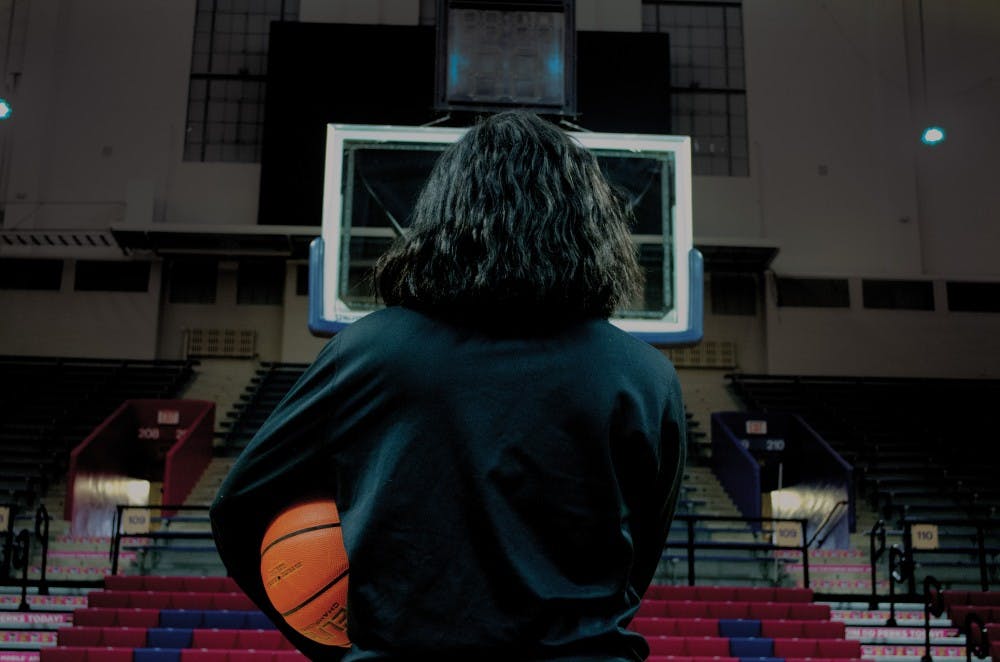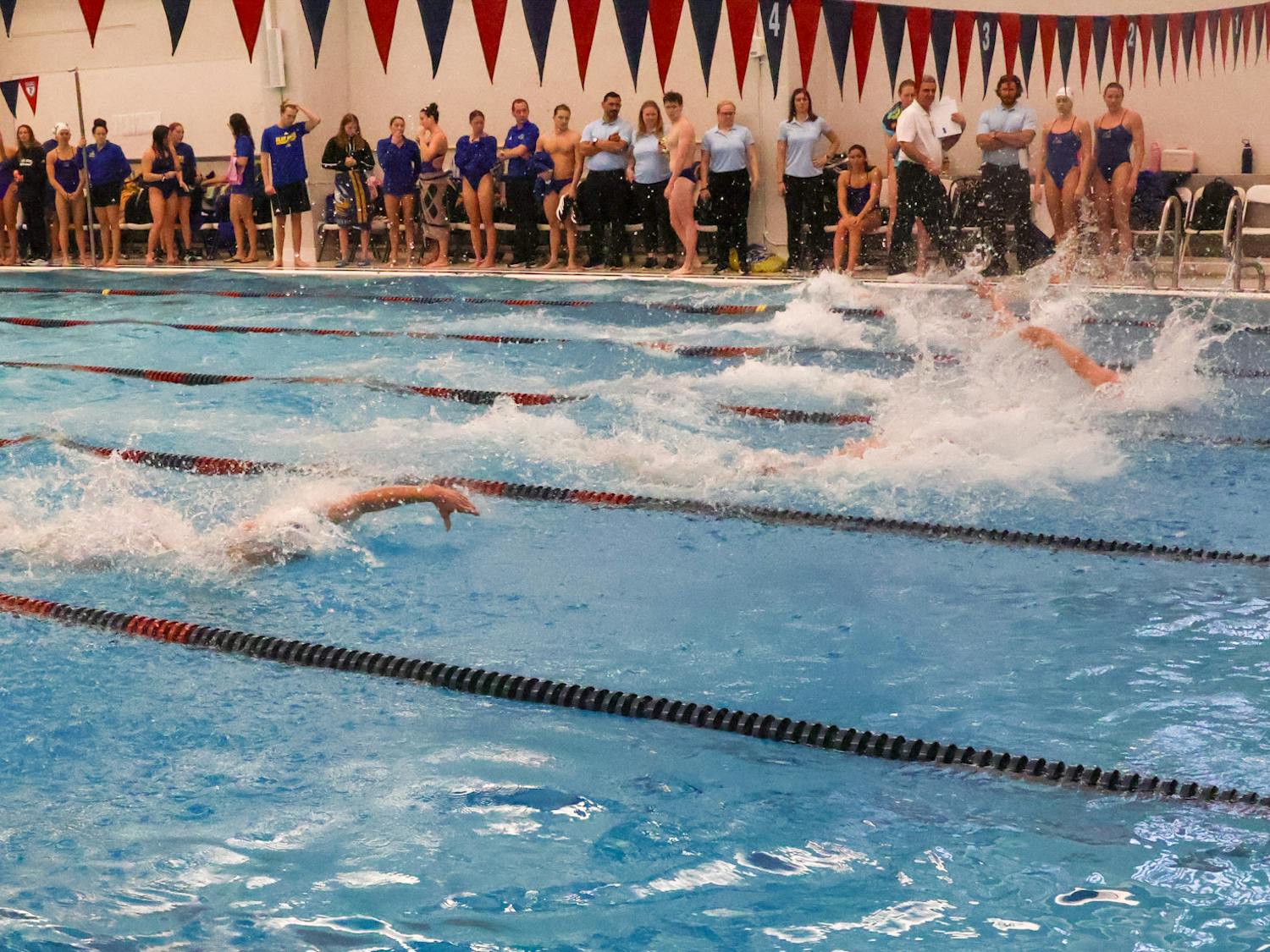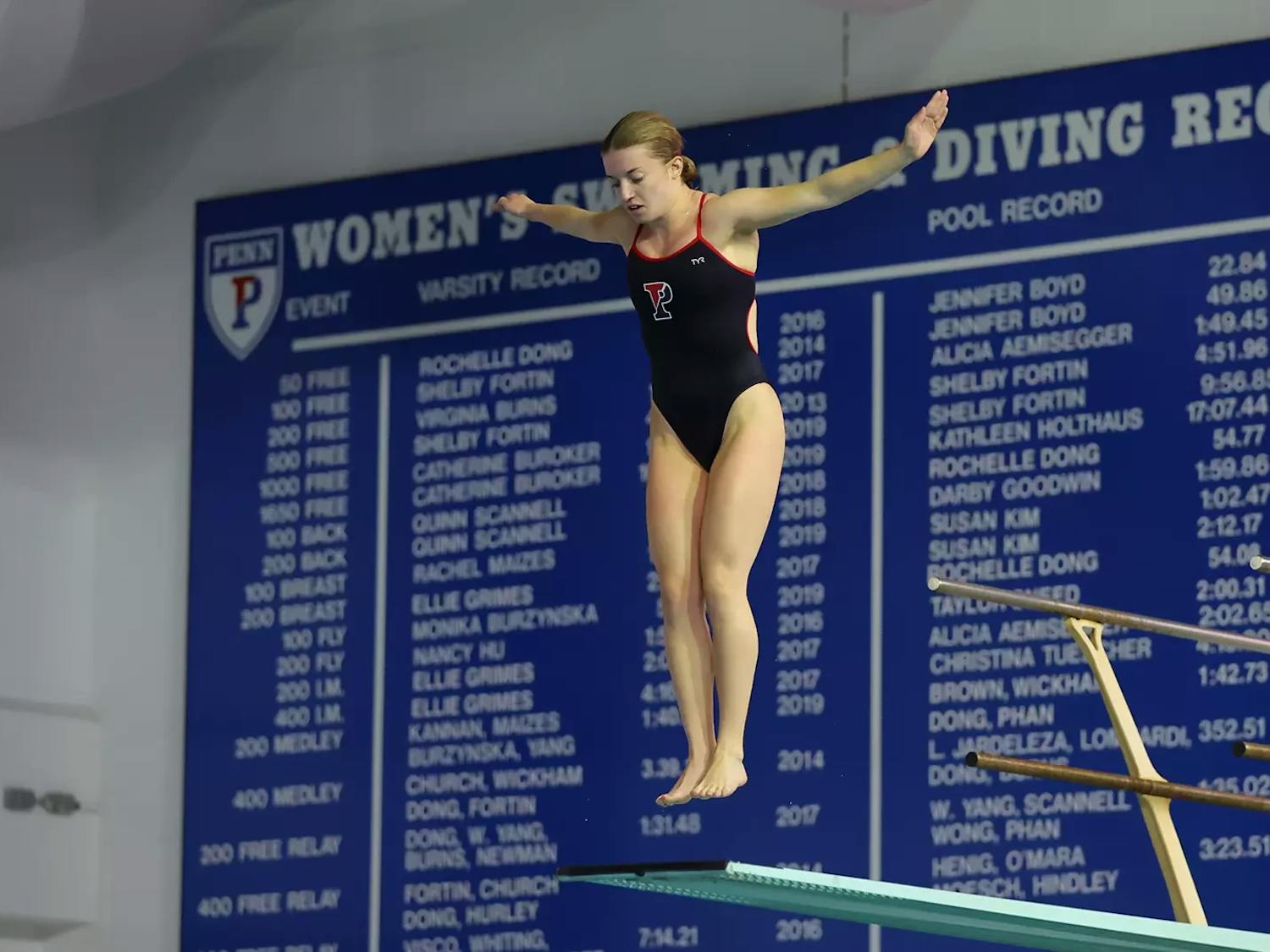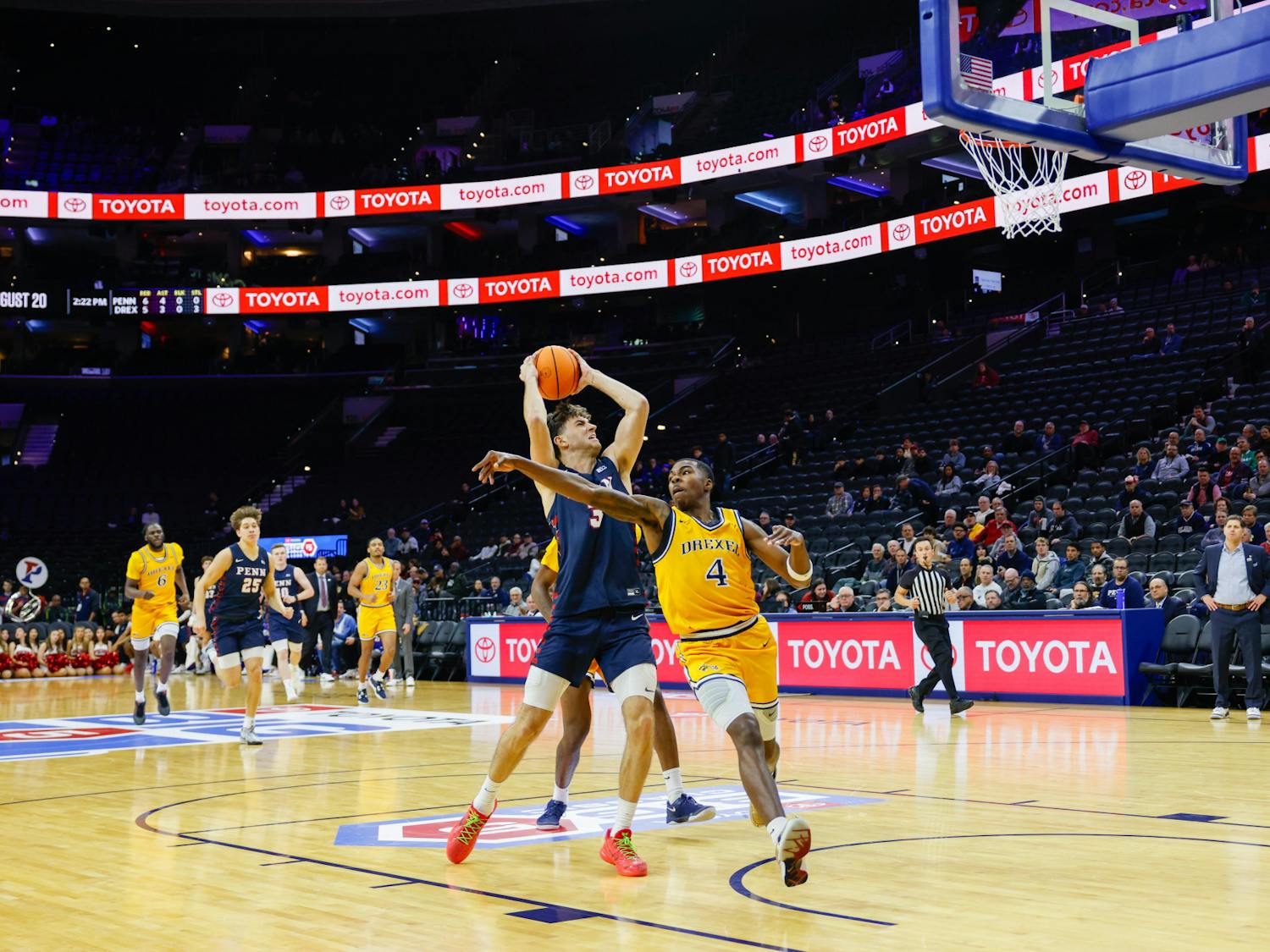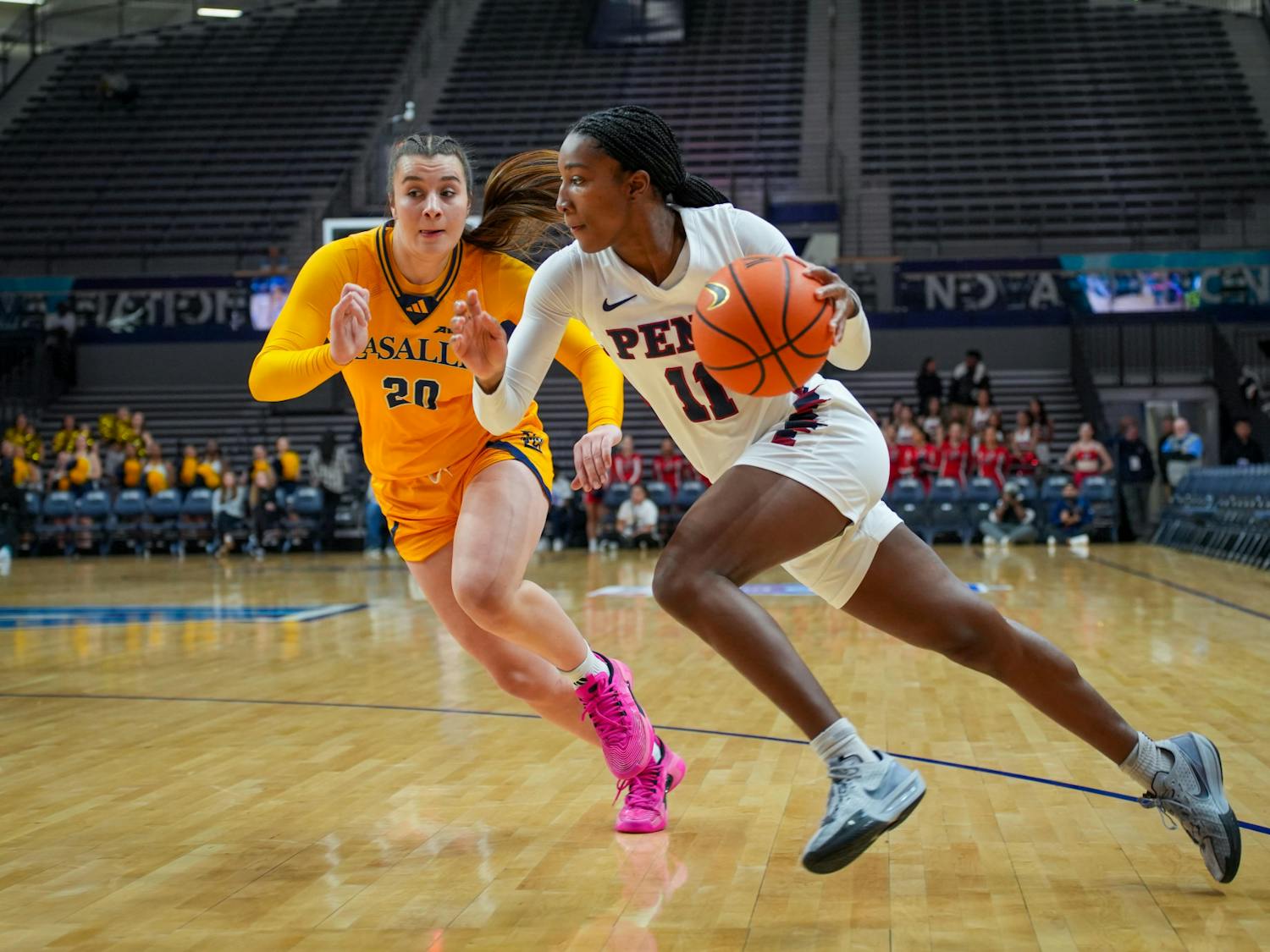It’s a Tuesday night game at Villanova for Penn women’s basketball. At tipoff, in the first chair on the bench, senior captain Keiera Ray intently watches a contest that she won’t be able to enter.
Donning her Penn sweats, she is still one of the players. And with clipboard in hand, she is now one of the coaches as well.
Stepping back a few short years ago, it’s hard to imagine a time when Keiera Ray would not be on the court controlling the game as the starting point guard for the Quakers.
As a freshman, the Chicago native played and scored in all 31 games for the Red and Blue, starting in 27 of them. Today, as a senior, she spends games on the bench, a mentor to her teammates after a series of knee injuries cut short a promising career.
While the opportunity to start as a freshman came about unexpectedly when then-junior point guard Meghan McCullough tore her ACL three games into the 2012-13 season, Ray did not shy away from the challenge despite playing forward throughout her high school career.
“It was a big transition,” she said. “It was really nerve-racking...not going to lie, but Coach McLaughlin said, ‘We really need you’ and I was like ‘OK.’ I knew I had to put more work in the gym.”
And that is exactly what she did. Ray continued to hone her craft as the team’s primary ball-handler, improving each week for the Quakers.
Her breakout performance came on a tough Ivy League weekend in which the Red and Blue faced Harvard — the eventual Ancient Eight runner up — and Dartmouth.
Related:
Basketball Supplement | For Penn women's basketball, four captains fill four very different roles
The lights go out for Penn women's basketball with 56-41 win at Dartmouth
At the Palestra, Ray had the hot hand from the beginning, dropping a career-high 31 points, notching six steals and leading the Quakers to a 77-72 win over Harvard, the team’s first victory over the Crimson in nine years.

The next night against the Big Green, the freshman continued her impressive performance, netting 19 points and matching her 60 percent shooting from beyond the arc from the previous game.
A star was born. Some slated Ray as the face of the program for the next four years.
Unbounded potential
Looking back to games like these, peers and coaches alike praise her play and intensity on the court.
“Keiera had a competitive drive,” McLaughlin said. “She was very team oriented but very competitive. She got to the basket as hard as any Penn player I’ve seen.”
Kathleen Roche, a Penn guard from 2012-15, also described this X-factor that Ray possessed on the court.
“She had a presence when the ball was in her hands,” she said. “She really had a knack for scoring the ball. She was a very smart player who understood the game.”
And people weren’t only paying attention in the Palestra. Her performance in these games was recognized on a national scale too. The following Tuesday, Ray was named U.S. Basketball Writers Association National Player of the Week, becoming the first man or woman in Ivy League history to claim this honor.
Maintaining steady numbers all season, Ray averaged 10.6 points per game and finished with the second-highest assist total on the team with 65.
While McLaughlin expected Ray to be prepared for the collegiate level due to the high caliber of play at her high school, Bolingbrook, even he was impressed by the numbers she put up during her freshman season.
“I knew she would take the challenge because she is extremely competitive,” he said. “She far exceeded my expectations. She went on and had a great freshman year and really stepped up for the team.”
These notable numbers weren’t the only thing Ray contributed to the team her freshman year. Ray’s mentoring presence and contributions off the court were evident even though she was one of the youngest members of the team.
“Even for me, when I was a sophomore and she was a freshman, I felt like she was a mentor for me,” Roche said. “She was always thinking about finding a way to win, and she was a good friend — always there for me. If I was shooting badly, she would come up and say ‘keep shooting, keep shooting.’”
‘I knew that there was something not right...’
But soon the fairy tale began to fade. Ray — who had dealt with injuries in the past — was forced to face to her fear that something was not right with her knees.
Despite her successful rookie season, Ray had a sense that there could be deep-rooted issues with her knee, a feeling she recognized from tearing her ACL in high school and her meniscus before her freshman season.
“I knew that there was something not right about it,” she said. “My knees would give out on me, and it got to the point where I would go for layup and have to fall because I didn’t want to land on my knees because it hurt so bad.”
After the season ended, she went to see a doctor. The exact date of her surgery is still etched distinctly in her memory. It was May 18, 2013. When doctors went to repair what they thought was just another torn meniscus, the surgeon discovered that her ACL was not functioning either.
She went on to have a double knee surgery, a grueling procedure that takes part of the patellar tendon from one knee to repair the muscles in the other.
“I was in two braces for about two weeks, so I couldn’t really do much,” she said. “That point was really difficult for me. I stayed in my room for 12 straight days. I had to have people help me do everything.”
Despite the daunting road to recovery, Ray’s competitive spirit never wilted, and she never questioned her desire to return to the court.
“I actually never thought about my knees not being able to take it [at that time],” she said. “I got so caught up in thinking that [the doctors] would just go in, sew some stuff up, [do] whatever they need to do, and then I would come back within the designated time frame and be back on the court.”
Eventually, Ray recovered from the procedure and was able to see limited action late in her sophomore season. As junior year rolled around, Ray readied for a full season back. Despite showing flashes of her freshman-self, scoring 22 points in the November matchup against Navy, knee injuries soon sidelined her again for the remainder of her year.
“I just had problems every day,” she emotionally recalled. “It got to the point where it hurt to walk, let alone run. Just walking, I was miserable.”
It was at this moment — at the urging of doctors, physical therapists and friends — that Ray began to wonder if her body could hold up to the stress of Division I basketball any longer, but she wasn’t ready to accept this fate just yet. Even today, she still hesitates to use the word “quit.”
“I had never actually thought about quitting basketball...not necessarily quitting but just having to stop because I felt like all the other times [surgery] worked, and when the last time it didn’t work, it was like, ‘Okay. Wow.’”
While Ray internally struggled with the decision that no athlete ever wants to face, her teammates and coaches supported her unconditionally.
“It was challenging to watch her go through it,” McLaughlin remembered. “We went through two years of hypotheticals and roles and ‘if I can play, it might be only play a little bit.’”
Before making any final decisions, Ray spoke to four doctors both at home and in Philadelphia. And each time she heard the dreaded words: “You need to stop.”
Still, she says she was in denial. Her competitive nature was telling her that she could overcome anything even if the doctors said she couldn’t.
But soon, the reality of the potential long-term damage began to set in.
“Finally, my physical therapist at home said, ‘If you don’t stop now, you’re not going to be able to run around with your kids when you’re older.’
“He just started breaking things down for me, and I was like alright. I guess it’s that time to stop. And then on the other side, I wanted to be here to help my teammates, and I didn’t think I could help them on the court at that point to be honest. It got worse than where I was before.”
A new chapter
Despite deciding to hang up her basketball shoes, Ray had a strong desire to stay on as a captain and mentor for the team — a role that she has fulfilled exceedingly well.
“She and I sat down and talked about ways that you can be satisfied with the end of your career without putting a jersey on,” McLaughlin said. “She said she would love this role, to be a mentor and off she went.
“I think ultimately, the decision [to retire] was made for her,” he said. “We talked about embracing it, and now establishing a new set of rules and expectations in this different role and how you can make the program better, and she has embraced it all. She hasn’t missed a practice, a workout [or] a film session. She is all in, and she has done some fantastic things for us so far this year.”
This intense commitment to the team is not a new phenomenon and doesn’t surprise her teammates at all.
“When she was playing she gave it her all and even now that’s she’s not playing, she still puts 100 percent energy into every day,” junior captain Sydney Stipanovich said. “I think not many people would do what she has done in staying with the team. It just shows her leadership — coming to lifts at 6 a.m., coming to every single practice.”
Roche isn’t surprised either about Ray’s dedication to the program despite her inability to contribute on the court.
“She would always come to everything in addition to going to all of her physical therapy,” Roche said. “She was always there for us in the locker room — always there as a presence.
“Just because she’s not playing anymore doesn’t mean she isn’t any more part of the team. I feel like she has found a way to become a very very important part of the team without being on the court which is hard to do.”
Fellow senior captain Brooklyn Juday echoes these sentiments and praises Ray for her unwavering commitment to Penn basketball.
“Her biggest trait — and this just speaks to the fact that she is still with the team after her injuries and she still plays such a big role — is that Keiera’s a very very loyal person,” she said. “She is loyal to her teammates, loyal to her friends, loyal 100 percent. She knew that even if she wasn’t going to be able to be on the court she was going to do everything she could do to make us the best that we could be, and that’s the role she has taken.”
Although there are still difficult moments when Ray wishes she could drive to the basket or go up for a rebound, she remains fully dedicated to her role as captain and is relishing her remaining time with Penn basketball.
“Some of [my teammates] constantly ask me, ‘Why are you still doing this?’ and my answer is because of them and because of the coaches. It’s them. I came in and they have been my family.”
And her “family” has similarly loving things to say about her.
“Keiera is probably one of my best friends on the team and one of my best friends off the court too,” Stipanovich said. “I think that’s how she is with a lot of people. She is the definition of what you want in a friend. She would put anything on the line for you as a teammate and a friend. Her being a great teammate makes all of us want to be. She is such a great example for all of us.”
One of the biggest roles Keiera has stepped into as a captain is mentoring the freshmen girls.
Whether she is talking to a freshman during the game or helping line up a tutor for a teammate, Ray, in her role, has been able to maintain connections with the team on and off the court.
“I try to be there to talk to them on the sidelines like, ‘Hey use your right leg more’ but I don’t strictly focus on the basketball aspect,” Ray said. “If you’re struggling with school work, I make sure to talk to you about different school possibilities like tutoring or anything like that.”
She even goes out of her way to remind younger players like Princess Aghayere, or “Prin Prin” as Ray calls her, to set their alarms in the morning and to call her when they wake up. Juday says that in this sense Ray has “become more motherly in her role.”
While Ray clarifies that she still views herself as a player first, her ability to step into the mentoring role so seamlessly has impressed McLaughlin too.
“She runs everything. She does a lot of off the court stuff — the team bonding. She gets the team together. She talks to them about [what] the expectations are for road trips and the professionalism we want to carry ourselves with. She has taken the lead for everything. Anything I asked her to do, above and beyond, she does.”
Not only has Keiera’s effort to stay involved and mentor younger players meant a lot to her teammates and coaches, but her story alone has inspired others to give 100 percent to the game while they can.
“She had so much — so much — more to give to the program [on the court],” Roche said. “And it just got cut short and that happens, but it just makes you cherish the games that you are able to play because you know that Keiera would kill to be able to keep playing.”
Despite facing adversity in the past, Ray views her new position on the team as an opportunity to grow and analyze the program from an outsider’s role with an insider’s perspective. Her teammates recognize this as well.
“Having her as an extra set of eyes when the coaches are focused on bigger, team-oriented things [and] having her there to help each person individually is really nice,” Juday said.

Through it all, Ray has maintained a positive attitude and has gradually reached the acceptance stage despite having to give up the game that she loves.
“I think I’ve matured so much to be honest just from this. My whole attitude has changed so much. I understand people more. I’m calmer. Just not having to be so angry at the fact that I can’t play because my knees are hurting or waking up in the morning and knowing that I had to go to practice but my body is just aching so badly.”
Beyond the Palestra
While she is cherishing her role as mentor this season, Ray has decided not to pursue coaching after graduation — at least for now. Next year, she will be attending Penn’s Graduate School of Education in hopes of becoming a teacher and implementing her mentoring gifts in a different arena.
In her mind, the time has come to say goodbye to the game, a bittersweet goodbye but one that can still have a happy ending nonetheless.
And that is what her teammates and coaches want for her: to go out on her own terms.
“She was determined to finish on her terms and I think this is it,” McLaughlin said. “I think she’s going to have a Penn uniform on her senior day, and she’s going to be able to walk out at the Palestra for her last day with her family by her side.
“I want her to be completely satisfied that she gave everything of herself to the university and to her teammates. I want to see a smile on her face and her to feel satisfied. It’s a little different from satisfying it on the court because she’s not able to play, but she can still impact us and she does impact us everyday.”
Keiera Ray may be sitting on the bench at the start of each game, but that doesn’t mean she doesn’t have goals for the team this year. She wants an Ivy League title for the squad, but that’s not all.
“I really want to win some games in the [post-season] tournament as well. I don’t know if its been done yet, but I’m all about making history here, so I think that’s one of the things we can do.”
Because who said you can’t make history from the first seat on the bench?


